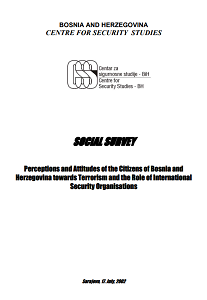Social Survey - Perceptions and Attitudes of the Citizens of Bosnia and Herzegovina towards Terrorism and the Role of International Security Organisations
Social Survey - Perceptions and Attitudes of the Citizens of Bosnia and Herzegovina towards Terrorism and the Role of International Security Organisations
Author(s): Bisera Turković, Vladimir Obradović, Sanja Ljubičić, Armin Kržalić, Amel Kadić, Arnel Šahurić
Subject(s): Political history, Social history, Security and defense, Criminology, Transformation Period (1990 - 2010)
Published by: Centar za Sigurnosne Studije
Keywords: terrorism; security; international security organisations; BiH; perceptions; attitudes;
Summary/Abstract: The survey of the perceptions and attitudes of the citizens of Bosnia and Herzegovina (BiH) towards terrorism and the roles of international security organisations (NATO, SFOR) comparatively encompassed subjects from the Federation of Bosnia and Herzegovina (FBiH) and the Republika Srpska (RS). Due to the content of the research only male subjects have been included, which we selected by a systematic, stratification sample, dependent upon telephone number in each individual canton. The control of the accuracy of the samples and the analysis of the results afterwards was conducted according to the variables of age, work experience and nationality. Besides this, we conducted focus groups that involved interviewing journalists, officers, professors, faculty assistants and students. The commentary and content of the discussion made possible a qualitative approach in the investigation. The most important findings of this investigatory research are: 1. Subjects from the FBiH and the RS are not differentiated by any statistical significance in the perceptions and evaluations that there is no serious threat from foreign terrorism in BiH, and that it is only possible to speak about internal terrorism towards returnees; 2. Anxiety from terrorism for the majority of the subjects from the older generation has not grown after 11 September 2001. Only within the group of younger subjects from the ages of 18 - 30 has this perception more significantly increased. However, the data from the focus group is interesting, which points towards the significance of the presence of negative perceptions towards the manner in which the US is leading the anti-terrorist campaign and the war against terrorism in Afghanistan; 3. Attitudes towards the accession to the European Union (EU) and the NATO Alliance are expressly positive between subjects in the FBiH, but that picture is diametrically reversed by the opinion in the RS, especially in view of the expressed negative position concerning the accession of BiH to NATO; 4. Confidence in international security institutions has an identical direction and relationship between the citizens of the FBiH and RS. Namely, the citizens of the FBiH have a highlevel of confidence in NATO, SFOR and the Hague Tribunal, while the citizens of the RS have little or no confidence in the Hague Tribunal; consequently, it is possible to speak about "group blindness" for the arguments and evidence concerning war crimes. 5. The attitude towards the downsizing of the military was positively polled by 80% of the subjects in the FBiH and 64% of the subjects in the RS, which is a statistically significant difference. However, the real gulf in attitudes of the citizens of the FBiH and RS is reflected in the level of support for a Joint Military Command, which has the support of 93% of the population of the FBiH and only 33% of the population of the RS.
Series: Centar za Sigurnosne Studije - MISCELLANEOUS PAPERS
- Page Count: 14
- Publication Year: 2002
- Language: English
- Content File-PDF
- Introduction

